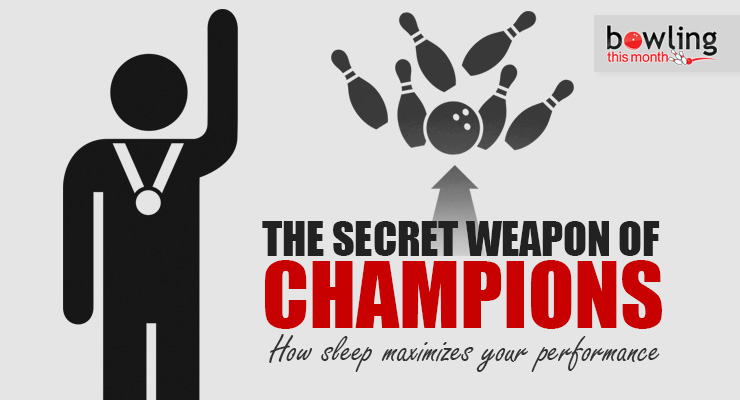Article Contents
- 1. Extra sleep improves performance
- 2. Sleep deprivation decreases performance
- 3. Recommendations
- 3.1. Increase your sleep leading up to an important tournament
- 3.2. Take a nap the day after a travel day or reduced sleep night
- 3.3. Pre-trip diet to reduce/eliminate jet lag
- 4. Conclusion
- 5. References
Note: This article is only available to Bowling This Month subscribers.
This month, I want to discuss a secret weapon. This secret weapon is critical to performing at your optimal best, yet few people take it seriously. Rather, this area is neglected, ignored or unrecognized as important. This secret weapon is how long you sleep. Research has revealed that extra prolonged sleep can improve athletic performance in a significant manner, while sleep deprivation is detrimental to performance.
Adults require an average of eight hours of sleep, whereas children and young people in their twenties physiologically need up to ten hours of sleep per night. When getting less than this amount, an individual builds a cumulative sleep debt. This sleep debt can impact short-term memory, reaction time and other important factors detrimentally. On a more serious note, sleep debt has been linked to heart and stomach problems, high blood pressure, cancer, pregnancy problems, obesity, anxiety, depression and even an increased risk of death.
I’d like to explore the importance of sleep on maximizing performance on the lanes. With a focus on sleep extension, getting more sleep than normal, you can prepare yourself to be at your best in tournament play. After reading this article, it is my hope that you approach your pre-tournament plan differently, and seriously focus on the amount of sleep that you get leading up to an important tournament.
Extra sleep improves performance
Research on sleep has found that athletes benefit greatly from getting more sleep than normal. Specifically, sleep extension research findings demonstrate the importance of sleep in the pre-performance phase of preparing for peaking for competition.
In a study of the Stanford University Women’s Tennis Team, participants improved their athletic performance after a period of extended sleep. Specifically, researchers were studying the impact of getting extra sleep on performance. Initial testing was completed over a baseline period of three to four weeks. Players slept during their normal time over this period. Then, during the next five to six weeks, they made an effort to sleep close to ten hours each night.
After the sleep extension period, athletes improved their sprinting speed as well as their hitting and serve accuracy. Sleep extension was associated with a faster sprinting drill (19.12 seconds at baseline compared to 17.56 seconds after sleep extension), increased accuracy including valid serves (12.6 serves ...
Already a premium member? Click here to log in.


